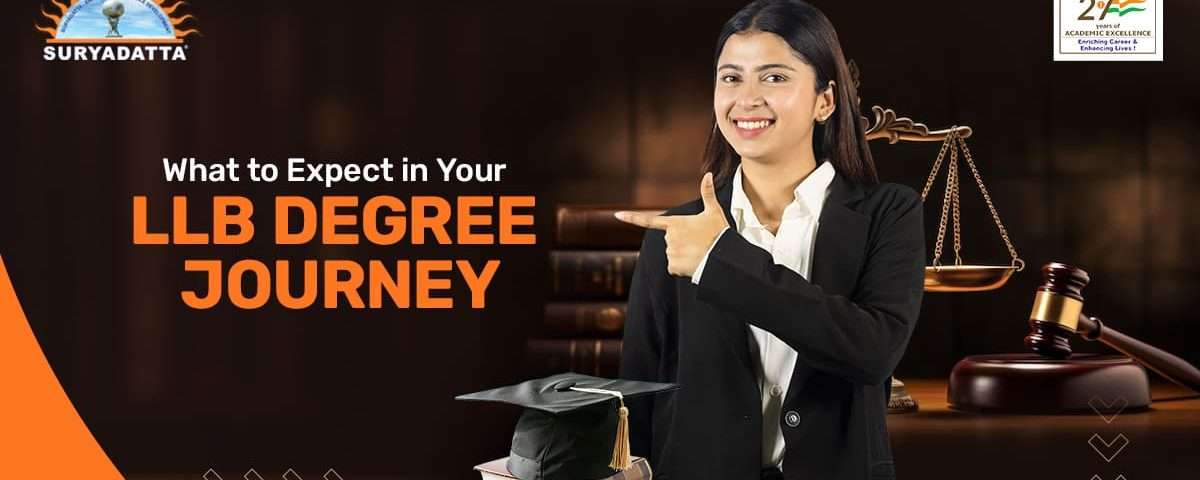What to Expect in Your LLB Degree Journey

Legal Education in Vernacular Languages: Bridging the Gap Between Law and Society
April 27, 2025
The Power of an Integrated Law Degree in Today’s Job Market
June 26, 2025Starting out in LLB is a very transformative decision which is true for those of you that see in yourself a future lawyer, judge, policymaker, or legal advisor. As a law professor at the University of Pune I had the privilege of working with hundreds of students through their legal academic passage. Many students come in with a lot of ambition but little clarity on the scope of a law degree. If you are reading this, you are probably at the stage of your career which is looking in which direction to go into law. It is a tough field but also an extremely rewarding one. This blog will serve to give you a full picture of what to expect during your LLB journey if you are planning to study in Pune which is an education hub in India.
Exploring the LLB structure.
In India the LLB degree program is run in two formats a) 5-year integrated course (for instance BA LLB or BBA LLB) which is for students out of 12th grade, b) a 3-year LLB program for graduates from any stream. The curriculum is put in place and regulated by the Bar Council of India (BCI) which in turn guarantees nationwide uniformity in legal education. Also, which path you choose is up to you but what you can expect is a tough academic structure which includes theory as well as practice.
In the city of Pune, law colleges report to a university which provides the colleges with their curriculum. It includes basic legal studies, elective specializations, moot courts, internships, and clinical legal education. Most students enrol in between five to six subjects each semester, and the academic year is split into two semesters. LLB experience is not just attendance at lectures and exam performance; it is a total immersion in the legal world.
Core Subjects You Will Study
In the LLB program, you will cover the full spectrum of the legal world. In the first year you will at which point you will begin with Constitutional Law which is the base of all Indian legal systems. As you go along, you’ll study Criminal Law, Contract Law, Property Law, and Family Law. Each subject is put in to help you out in the Indian judiciary, legal processes, and your rights and responsibilities as a citizen and a lawyer.
As you move into the 2nd and 3rd years, we see in the mix of more specialized subjects like Company Law, Labour Law, Environmental Law, Cyber Law, and Human Rights Law that you will also be studying. Also, on the table is Jurisprudence which looks at the thought process behind legal principles. That diversity of study helps to shape well rounded legal professionals. The Bar Council of India’s report (2023) also brings to light that law graduates which have been through a curriculum of both core and applied law do better.
Day-to-Day Life of a Law Student
What most people think is, law school is not a place for memorizing sections of the IPC or at your desk. Your day may open with one after other lectures which are followed by discussion, group work, or library research. You will be doing case briefs, taking part in debates, and working on presentations. What is put into practice is critical thinking where professors constantly get you to question the existing laws and present reasoned arguments against popular opinions.
Pune, a city which is very much student centered, has a great academic environment. Also, many of its colleges which are very much into the development of the student’s personality see to it that they are a part of court room sessions, moot court competitions and legal awareness programs. Also, you will be encouraged to write legal essays and articles which may be published in student journals which in turn will help in improving your legal as well as writing skills.
Practical Training and Internships
Internships are a key component of the LLB program. From the very first year we encourage you to get out there and do practical work over the break times. You may work at a law firm, with an experienced advocate, at an NGO, at district court or legal aid center. We aim to have you apply legal theory to real world issues.
In my experience, it has been that which students do at least 3-4 internships while they are in degree that develops stronger legal skills and better professional networks. Also, in Pune, which is near the Bombay High Court, many law firms and NGOs provide great internship opportunities. As of 2023, in a report by Bar Bench we see that students which have had very good internship experience are 1.5x more likely to get jobs right out of graduation.
Legal Skills You Will Acquire
The LLB program is not merely a matter of learning information—it’s learning to change how you think and speak. During your studies you will gain several key skills. We see legal research as second nature to you as you will practice in the court for databases, case laws, and past precedents. Your written communication improves by writing petitions, contracts, and legal opinions. Thinking and reasoning are developed through interpreting the law and building legal arguments.
Additionally, your skills in public speaking will be honed by the practice of moot courts and observations in court. These are not only important in litigation, but in corporate law, judiciary services, as well as entrepreneurship. Institutions such as Suryadatta Law College incorporate soft skill and ethics courses within the curriculum so that students are equipped for the practical legal settings.
Conquering LLB Challenges
All academic courses present their own challenges, and the LLB course is different. You may find it challenging with the immense amount of reading required. Legal materials may be difficult, and comprehension of their application within actual cases requires time. You are also out of time at times which in turn may see you struggling to balance internships, assignments, and extracurricular activities. Also, you may have issues with legal English and Latin terms as they appear in reports and in the court.
To surmount these, I recommend students to read a newspaper such as The Hindu or The Indian Express every day, subscribe to legal blogs, and follow language improvement sessions. Establishing a reading habit early on works, as does the creation of study groups to dissect challenging judgments and discuss legal theories.
Career Opportunities After Your LLB
Your LLB qualification opens doors far more than you think. Although litigation and working as a lawyer in courts is a classic career option, graduates nowadays have career choices from corporate counsel positions, legal officers in the public sector, to judicial service. Many students prefer to specialize through LLM courses or pursue careers in legal journalism, intellectual property rights, compliance, and cyber law.
In Pune, you’ll be studying in an ecosystem surrounded by MNCs, start-ups, and government bodies, all of which require legal talent. Students that go into law may take the Judicial Service Exams, study for an LLM abroad, or find their own practices with the right licensing. As reported by India Education Review (2024) we see an annual growth of over 12% in the demand for skilled law graduates which is being powered by tech, finance and health care sectors.
Why I Would Suggest Suryadatta Law College (SLC)
Having worked with several institutions in Pune, I would say that Suryadatta Law College (SLC) is one of the most innovative legal education institutions in the area. Their method involves melding conventional legal studies like digital law research labs, interactive case studies, and legal tech workshops. As a Pune student seeking a well-rounded LLB program, SLC is worth considering.
Go over the LLB programs at Suryadatta Law College and enter the world of law with confidence and clarity.
Conclusion: The Journey Is Demanding but Rewarding
Your time in the LLB program will put to the test your dedicated effort, resilience, and curious spirit. You will go through what may be tough times, academic stress, and late-night readings. But from these comes great personal growth, mental fulfillment, and the fact that you left your mark. Law is not just a career it is a devotion to justice and reality.
If you stay put, surround yourself with the right people, and take advantage of the legal vibrancy in Pune which is at your service, your LLB education will transform you into a very confident and competent legal professional which in turn will see you serve society and uphold justice.


